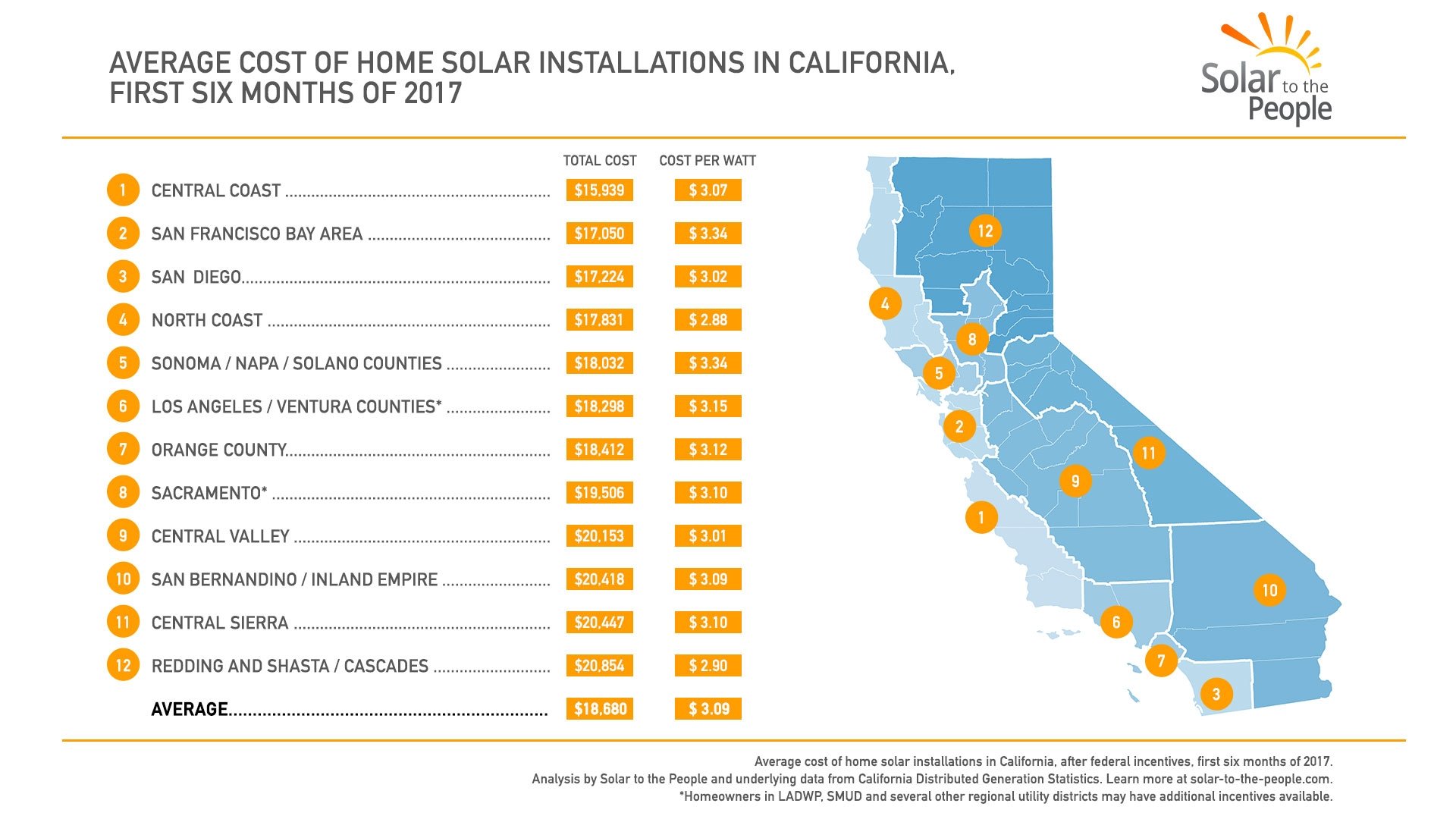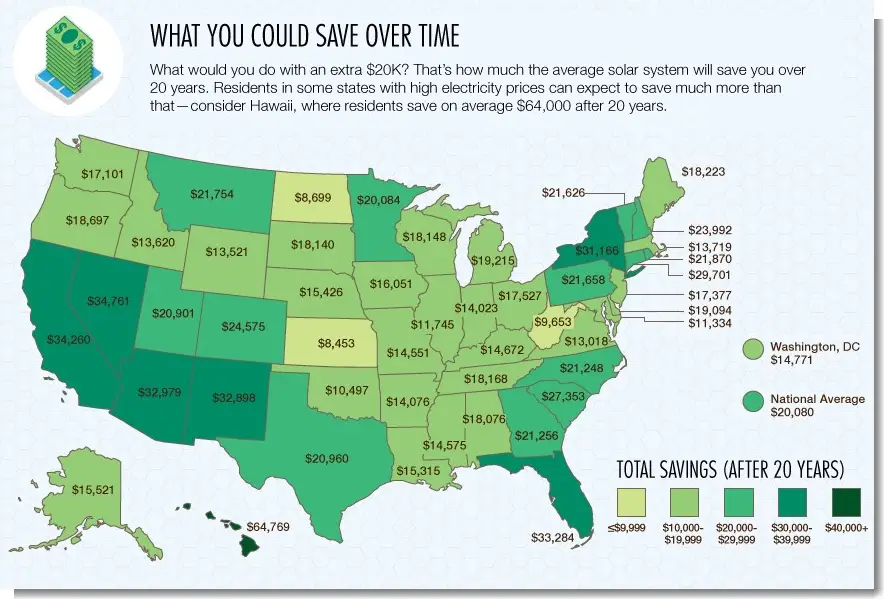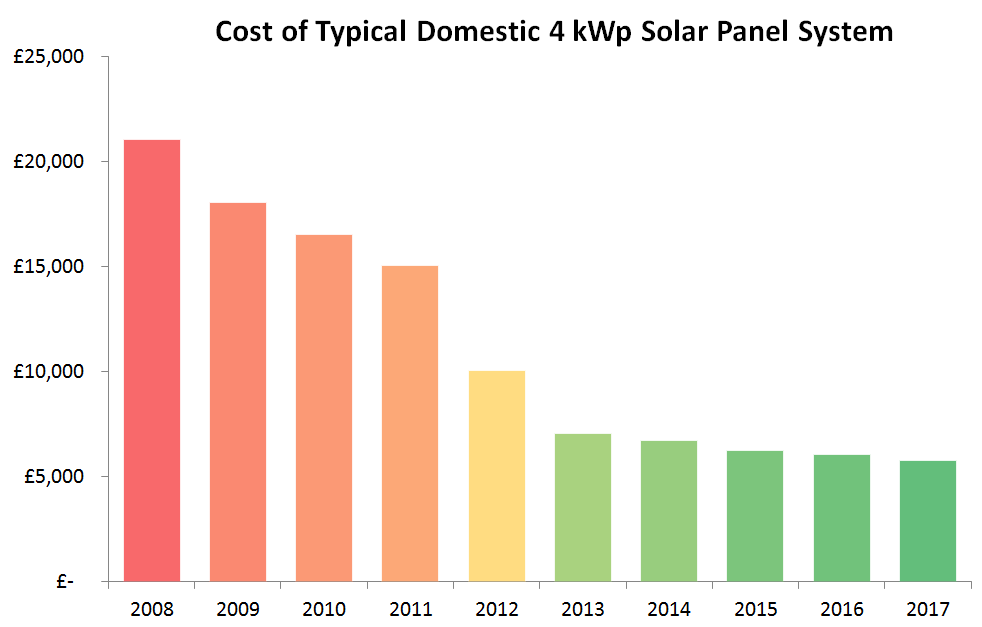How Much Does Solar Installation Cost A Look Into Average Prices For Solar Panels
In 2010, an average homeowner in the United States would have paid around $40,000 for a full-size solar panel system for their home. Fast forward to 2021, the average cost for a solar panel installation has fallen 50% to roughly $20,000 .
Breaking down math is pretty simple. Just multiply the price per watt by the size of the system you need for your home: $3.20 per watt times 6,000 watts equals $19,200 there you have the average cost of a solar panel installation for your home. But where exactly do those numbers come from? And are there any local incentives available to slash that price tag even further? Thats what were here to help you understand.
Solar Costs Over Time Continue To Fall
A solar panel system hasnt always been $2.76/W. As recently as five years ago, the cost of solar panels was almost 20 percent higher than it is now:
Prices will likely continue to fall even more in the future. The solar industry is still young, and theres plenty of innovation still to come. As manufacturing and installation processes mature and become even more efficient, solar shoppers will hopefully start to see some of those cost savings impacting their sticker price for solar.
How Much Does A Single Solar Panel Cost
If youre looking to buy your own solar panels and install them yourself, you can expect to pay somewhere between $200 and $250 per solar panel. That doesnt include other costs, like inverters, wiring, and installation, which is why the cost of a full solar panel system installation seems much higher.
Recommended Reading: How Long Until Solar Panels Pay Off
Federal Solar Tax Credits And State Solar Incentives
When you own your home solar system, you are eligible to apply for available federal and state incentives and rebates.
In December of 2020, Congress passed an extension of the federal solar Investment Tax Credit , which provides a 26% tax credit against the costs of the purchase and installation of residential solar systems installed between 2020 and 2022. Next year in 2023, that credit will decline to 22% for home solar systems. How much will the ITC save a home solar system owner? For a $20,000 system, the 26% federal credit would be $5,200, compared to $4,400 under the 22% credit.
Several states also offer solar tax credits and solar tax rebates. People who own their solar system and/or battery in participating states may be able to claim these expenses on their local taxes or receive cashback on their installation. While you may be eligible for a solar tax credit or a solar tax rebate with the purchase of a home solar system, please remember that tax incentives are subject to change.
Understanding The Solar Investment Tax Credit

As we alluded to earlier, the ITC has been an overall boon to the expansion and health of the solar industry. As of 2021, the ITC reduces the cost of installing solar panels by 26%, and its a large reason the solar industry has consistently experienced a 42% annual growth rate for the past decade.
Unfortunately, the residential ITC is set to completely expire by 2024, with the ramp down already happening now. Thankfully, solar panel installations costs overall have decreased during the life of the ITC, but the solar panel industry is still preparing for a slowdown in installations in the short-term future. Therefore, if there was any time to consider solar panels for your home, the time is now. The discount is only going to decrease.
Also Check: How To Save Solar Energy
Why You Can Trust Ecowatch
We work with a panel of solar experts to create unbiased reviews that empower you to make the right choice for your home. No other site has covered renewables as long as us, which means we have more data and insider information than other sites. Our rankings are never affected by revenue or partnerships.
Review Your Electric Bill
Solar panels generate their own power and can therefore greatly offset your monthly electricity bill, if not eliminate it. The higher your bill, the more likely youâll benefit from switching. But you should note that electricity rates and usage the main charges on your statement are volatile.
âIf a utilitys electricity prices fluctuate, so could the amount of savings,â says Garrett Nilsen, deputy director for the U.S. Department of Energyâs solar energy technologies office. âSimilarly, if energy consumption changes, the amount of savings can also vary.â
Visit the EIA website to view the most recent prices per state.
You May Like: What Is The Average Cost Of A Solar Panel System
How Much Do Solar Panels Cost
Solar panels are a considerable investmentnot just for the sake of your community and planet, but for your homes value. Various factors influence how much a solar system costs, including the panels you choose, your homes energy needs, and applicable state and federal tax incentives.
We have conducted in-depth research on the best solar installation companies in the United States and the industry overall. This guide breaks down the significant factors that influence what solar panels cost, as well as the national average for a solar energy system.
Find Top Solar Installers Near You
How Much Money Can Solar Panels Save You For Your Specific Home
One of the easiest ways to find out how much you can save with solar panels is by using our solar calculator. SolarReviews has the worlds first solar power calculator that shows the system size thats right for your home and what your return on investment could look like.
Estimate your solar savings
Our calculator provides savings estimates based on the following:
- Your location
- Your energy usage
- Current average price offered by solar companies in your area
We also outline what solar tax incentives and other rebates are available in your area that will help bring down the upfront cost of a solar power system.
Read Also: What Are The Government Incentives For Solar
Factors That Contribute To The Cost Of Solar Panels
There are many factors that contribute to the cost of solar panels. Understanding the how and why of any cost variance will help you plan your solar installation accordingly. Lets review the elements that impact the overall cost of your solar system and how you can use them to your advantage.
The cost of solar panels has become more and more affordable as the industry grows. In fact, government incentive programs have allowed homeowners to install solar panels at a reduced cost. However, the type of solar panel system, property location, and the size of the system are variables that greatly impact the overall solar panel cost. When you are considering going solar, you should also consider these factors to determine the right system and method of installation for you.
Disadvantages Of Solar Panels
As with most things, where there are advantages, there are also disadvantages to consider when thinking about installing a solar energy system. Some disadvantages associated with solar energy systems include:
Recommended Reading: How To Build Your Own Solar Panels From Scratch
How Much Do Solar Panels Save Do Solar Panels Really Save You Money
The simple answer to the question do solar panels really save you money? is yes. That being said, how much youll save depends on a number of factors. Direct hours of daily sunlight and the size and angle of your roof are both important, but local electricity rates play the biggest role in determining how much solar can save you.
With so many trendy investment opportunities available in todays day and age, its easy to be skeptical of new products that boast promises of saving you tons of money. Solar panels are no different saving money by reducing your electric bill is one of the main appeals and selling points for solar as a product and home upgrade.
Read Also: Does My House Qualify For Solar Panels
Benefits Of Solar Panels

There are many advantages of solar energy to consider when youre deciding whether or not to install solar panels, such as:
Read Also: How To Put Solar Panels On Rv
What Is The Cost Of A Solar Panel Installation For An Average 2000 Square Foot Home Today
The average cost of a residential solar panel installation in 2021 ranges between $18,000 and $20,000, before applying tax credits or other incentives that may be available where you live. This works out to between $2.75 and $3.35 per watt of solar installed, depending on your location and the brands of solar equipment used.
Once you take the federal solar tax credit into account, the overall cost drops to an average of between $13,320 and $14,800 – thats almost 80% lower than the cost of solar 10 years ago! Our solar panel cost and savings calculator will show you local incentives you may be eligible for to help lower the upfront costs.
How Many Solar Panels Will You Need
To know how many solar panels you will need, you will want to determine how much electricity you use in your home and the solar panel types installed.
The average house in the United States uses about 900 kilowatt hours a monthroughly 11,000 kWh a year. You can easily calculate your actual usage by looking back at your electricity bills. As a general rule of thumb
- A 3-kWh solar panel system will generate about 3,600 kWh 4,800 kWh per year.
- A 5-kWh system produces about 6,000 8,000 kWh per year.
- A 10-kWh system can produce about 12,000 kWh 16,000 kWh per year.
Depending on the size of the system, the solar panels cost would be between $4,000 and $16,000. Add in another $3,000 to $10,000 for other necessary components, such as racks for the panels, wiring, solar inverter costs, and the total solar panel installation cost would now be closer to $20,000.
Talk to Contractors
You May Like: How Much Money To Install Solar Panels
Solar System Cost Analysis Wrapping Up
We hope that this cost analysis helped you get a grasp on the expenditures that go into installing a solar panel system on your residence.
It really all comes down to how big of a system you want and what installer you go with. But regardless, solar prices are down across the board in 2017 and the costs have literally never been lower to make the switch.
We are extremely excited about the future of solar and see the prices continuing to decline, offering great opportunities for customers to do their part in saving the environment and saving on their energy bill in the process.
Here is a breakdown of the cost of solar in the United States. For a more detailed analysis, see the explanation below it!
Here at Solar Action Alliance, we like to inform our readers about all things solar. One of the most pressing questions for somebody that is considering installing solar panels on their home is: what will this cost me?
Its a good question, and one that seems to generate a lot of different answers from a lot of different websites. Some people try to answer by including your savings but we find that most people are just curious about the upfront cost. If you want to know about the savings you can find by going solar, check out our page on solar savings!
Were going to try and answer this question as simply as possible.
Are Solar Panels Getting Cheaper
Solar panel prices have dropped dramatically since 2011, and fallen again over the past couple of years.
The average cost for a kilowatt of solar panels fell by around £250 between 2018/19 and 2020/21, according to statistics published by the government’s Department for Business, Energy and Industrial Strategy in May 2021.
It said that the median average cost per kilowatt of a small solar PV installation was £1,429.
Back in 2013-14, the average cost was around £480 more per kW.
Recommended Reading: How Much Maintenance Do Solar Panels Need
Cost Of Solar Panels By State
One of the broadest ways to gauge the overall cost of solar is by looking at the average price of solar panels by state. Our statewide average prices are calculated using market research and data from top brands. These prices can help convey a better understanding of what solar might cost in your area:
| Average Cost of Solar By State | Average Cost of Solar Per Watt | Average Cost of a 5kW System After Tax Credit |
| Alabama | ||
| $2.57 | $9,509 |
Keep in mind that 5kW is a baseline size and near the smaller end of most solar panel installations. Use this figure as a minimum.
Location Of Your Home
Lets get real here: A home in Phoenix will create more solar electricity than one in Portland whether Oregon or Maine even if both homes are completely bereft of trees.5 Geography is essential to the efficient generation of solar power. You can always install solar panels on your roof wherever you live, but where you are matters, too.
You May Like: How Reliable Is Solar Power
Large Solar Battery Storage System Units
These units range from $4,000 to $11,000 on average, not including installation however, some larger units can cost $30,000 or more. If youre hoping to power an entire house, you probably dont want to install a big stack of smaller units. Popular brands like Tesla, Sonnen, Sungrow, BYD, and Powerplus all offer larger units. You can still stack these batteries, but you might find that one larger system is enough to keep your home powered.
Find a Pro for Your Solar Battery Storage Project
Solar Battery Storage System Cost Factors

There are many factors to consider when calculating your total solar battery project cost. Here are the biggest factors that can impact your budget:
- Energy capacity: A major cost factor is how much energy your battery can store. Units that store more kWh cost more than units that store less.
- Power: Your batterys potential output is shown in kilowatts and determines how much electricity the battery can generate in a specific moment. Storage systems that are more efficient at storing energy are likely to cost more.
- Battery chemistry: Lithium-ion phosphate batteries cost more than lead-acid batteries, with LFP batteries costing approximately 30% to 50% more than some of the cheapest batteries on the market.
- Brand: One brand might charge more than another, but it might also have installation prices tacked onto the total cost that saves you money.
- Quality: High-quality materials will run higher than low-quality materials.
- Upgraded features: Inbuilt inverters, smart technology, and other upgrades may add to the cost of your battery unit.
- Installation company: Some battery brands do not come with installation, as theyre solely for solar equipment. You may have to purchase the battery through the manufacturer and then find a separate installation company.
- Retrofitting an existing system: Youll pay more to have a battery added to an existing solar panel than if you installed them at the same time.
Don’t Miss: How To Get Off The Grid With Solar Power
Size And Shape Of Your Roof
This one is a double whammy. The contours of your roof impact both the number of solar panels youll need to generate the necessary energy for your home and the labor involved in installing them for maximum efficiency. For example, gabled roofs with high peaks create lots of nooks and crannies for shadows, and they can be difficult for solar installers to navigate.
Average Monthly Energy Usage
This is the big one, if were being honest. Your energy bill will determine the size of the solar system you need therefore the number of panels you will need. While the average U.S. residential solar system is in the 5-kilowatt range, your family might be especially thrifty, meaning you might need only 4 kW to power your 2,000 square foot home.6 On the other hand, if you have a large family that entertains often and has installed lots of amenities in that same 2,000 square foot home, you might need an 8 kW system and that will cost more.
